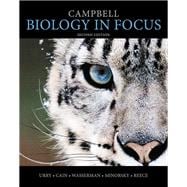NOTE: You are purchasing a standalone product; MasteringBiology ™ does not come packaged with this content.
If you would like to purchase both the physical text and MasteringBiology, go to pearson.com/us and search for:
0321962583 / 9780321962584 Campbell Biology in Focus Plus MasteringBiology with eText -- Access Card Package, 2/e
Package consists of:
- 0134156382 / 9780134156385 MasteringBiology with Pearson eText -- ValuePack Access Card -- for Campbell Biology in Focus
- 0321962753 / 9780321962751 Campbell Biology in Focus, 2/e
In 930 text pages, Campbell Biology in Focus, Second Edition, emphasizes the essential content, concepts, and scientific skills needed for success in the college introductory course for biology majors.
Focus. Practice. Engage.
Campbell Biology in Focus is the best-selling “short” textbook for the introductory college biology course for science majors. Every unit takes an approach to streamlining the material that best fits the needs of instructors, based on surveys, curriculum initiatives, reviews, discussions with hundreds of biology professors, careful analyses of course syllabi, and the report Vision and Change in Undergraduate Biology Education. The Second Edition builds on the Campbell hallmark standards of accuracy, clarity, and pedagogical innovation, going beyond this foundation to help students make connections visually across chapters, interpret real data from research, and synthesize their knowledge.The accompanying digital resources include new, mobile-friendly tools that help instructors teach challenging topics better than ever before; integrate the eText with videos and animations; and allow students to test, learn, and retest until they achieve mastery of the content.
Also Available with MasteringBiology ™
This title is also available with MasteringBiology – an online homework, tutorial, and assessment product proven to improve results by helping students quickly master concepts. Students benefit from self-paced tutorials that feature personalized wrong-answer feedback and hints that emulate the office-hour experience and help keep students on track. With a wide range of interactive, engaging, and assignable activities, students are encouraged to actively learn and retain tough course concepts. New MasteringBiology activities for this edition include Interpret the Data Questions, which challenge students to analyze real data presented in a graph, figure or table, and Solve It Tutorials, which engage students in a multistep investigation of a scientific “mystery.” For instructors, new Ready-to-Go Teaching Modules provide easy-to-use assignments for before and after class plus in-class activities with clicker questions and questions in Learning Catalytics™.








